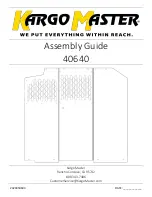
Improper alignment will not cause vehicle vibration.
Vibration may be a result of tire and wheel out-of-
balance. Proper balancing will reduce vibration and
avoid tire cupping and spotty wear.
SUPPLEMENTAL TIRE PRESSURE INFORMATION
– IF EQUIPPED
A light load vehicle condition is defined as two passen-
gers {150 lbs (68 kg) each} plus 200 lbs (91kg) of cargo.
Cold tire inflation pressures for a lightly loaded vehicle
will be found on the face of the driver’s door.
TIRE CHAINS
Use “Class S” chains on 1500 Ram Trucks, or other
traction aids that meet SAE Type “S” specifications.
Use “Class U” chains on 2500/3500 Ram Trucks, or other
traction aids that meet SAE Type “U” specifications.
NOTE:
Chains must be the proper size for the vehicle,
as recommended by the chain manufacturer.
CAUTION!
To avoid damage to your vehicle, tires or chains, observe the
following precautions:
•
Because of limited chain clearance between tires and other
suspension components, it is important that only chains in
good condition are used. Broken chains can cause serious
vehicle damage. Stop the vehicle immediately if noise
occurs that could suggest chain breakage. Remove the
damaged parts of the chain before further use.
•
Install chains as tightly as possible and then retighten
after driving about 1/2 mile (0.8 km).
•
Do not exceed 45 mph (72 km/h).
•
Drive cautiously and avoid severe turns and large bumps,
especially with a loaded vehicle.
•
Do not install tire chains on front wheels of 4x2 vehicles.
•
Do not drive for a prolonged period on dry pavement.
•
Observe the tire chain manufacturer’s instructions on
method of installation, operating speed, and conditions for
usage. Always use the lower suggested operating speed of
the chain manufacturer if different than the speed recom-
mended by the manufacturer.
352
STARTING AND OPERATING
Summary of Contents for 1500 2006
Page 2: ......
Page 8: ......
Page 66: ...Multiple Child Restraint Quad Cab 66 THINGS TO KNOW BEFORE STARTING YOUR VEHICLE...
Page 104: ...Multiple Child Restraint Quad Cab 104 THINGS TO KNOW BEFORE STARTING YOUR VEHICLE...
Page 110: ......
Page 141: ...UNDERSTANDING THE FEATURES OF YOUR VEHICLE 141 3...
Page 142: ...142 UNDERSTANDING THE FEATURES OF YOUR VEHICLE...
Page 143: ...UNDERSTANDING THE FEATURES OF YOUR VEHICLE 143 3...
Page 212: ......
Page 217: ...INSTRUMENTS AND CONTROLS UNDERSTANDING YOUR INSTRUMENT PANEL 217 4...
Page 218: ...INSTRUMENT CLUSTER 218 UNDERSTANDING YOUR INSTRUMENT PANEL...
Page 287: ...Operating Tips Chart UNDERSTANDING YOUR INSTRUMENT PANEL 287 4...
Page 288: ......
Page 342: ...342 STARTING AND OPERATING...
Page 396: ......
Page 422: ......
Page 426: ...ENGINE COMPARTMENT 3 7L 4 7L 426 MAINTAINING YOUR VEHICLE...
Page 427: ...ENGINE COMPARTMENT 5 7L MAINTAINING YOUR VEHICLE 427 7...
Page 517: ...INDEX 10...
Page 535: ...NOTES...
Page 536: ...NOTES...
















































